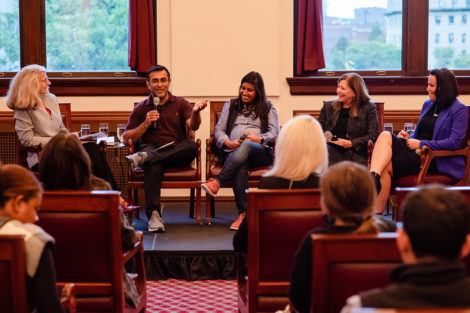October 10, 2019 – Dentist Hitesh Tolani came from an immigrant family that spent years trying to achieve legal status in the U.S.—which they eventually did with the help of lawyers, politicians, and thousands of South Carolinians who learned of their struggles through news stories. After that experience, Tolani wanted to “pay it forward.” He knew that 40% of Americans lacked access to oral health care, so he decided to tackle the huge challenge of improving access for people who rarely made it to the dentist as well as for underserved populations.
In 2014, after honing a business model at the Harvard Innovation Labs, he founded a startup called Virtudent, which provides dentistry where people work or in other pop-up locations. In workplaces, hygienists perform onsite exams; Virtudent dentists review x-rays and other diagnostic data online; and patients get referrals to local dentists if they need further care. With profits generated from its work with employers, Virtudent provides mobile clinics in remote locations for low-income children who might not otherwise have access to a dentist.
Tolani was one of four panelists who spoke at an October 3, 2019 event for students at Harvard T.H. Chan School of Public Health titled “Entrepreneurism and Venture Capital in Public Health.” The overall message from Tolani and the other panelists—who all work at the intersection of business and public health—was that it makes good sense for people who are passionate about public health to think about how entrepreneurism and venture capital can help them achieve their goals, whether they want to start their own venture or help others do so.
Other panelists included Susan Golden, ScD ’81, director of dciX* at the Stanford Center on Longevity, which focuses on creating innovations and new business opportunities to support longevity and healthy aging; Payal Agrawal Divakaran, MBA ’15, who co-leads the digital health investing practice at Boston-based venture capital firm .406 Ventures; and Martyna Skowron, MPH ’12, founder and CEO of NaStrovya, a health tech startup in the San Francisco Bay area. Linda Cyr, lecturer in health care management at Harvard Chan School, moderated the event.

The panelists urged the students to take advantage of opportunities in the Boston area to learn about entrepreneurism and venture capital.
When Skowron was a Harvard Chan student, she took classes across Harvard—in business, design, engineering, education, and politics. In one class at Harvard Business School, she became familiar with the workings of venture capitalism and learned more about types of innovation that the industry looks for. “The people who make you most uncomfortable—talk to them,” she said. “Ask questions. Be curious.”
Payal advised students who want to start a new public health venture to work in multidisciplinary teams. “If you’re going to start a company, you’re going to have to complement your expertise and knowledge with perhaps someone who is a little more business-oriented, a little more operations-oriented,” she said. “The best ideas are done in collaboration.”
Golden recommended that students attend conferences, take edX courses, and subscribe to newsletters focused on the intersection of business and health. For students interested in helping to finance innovative public health ventures, she suggested considering a fellowship training program at a venture capital company. She also advised networking whenever possible—with everyone from college roommates to medical school classmates to people at conferences.
“Make friends with every single person you meet,” she said. “You never know when you’re going to need to bump into that person for due diligence, or for deal flow, or to get somebody on a board, or to put them into a CEO position.”
Golden added that she used to think that being a venture capitalist was not in line with her values. But now she feels differently. “You can have a social mission and you can have a for-profit enterprise,” she said. “You can do well and do good at the same time—that’s my philosophy.”
photos: Osa Igiede
